Who Are the Songs on Taylor Swift’s New Album Really About? We Break It All Down.
The premise of Name Check, an occasional Slate feature, is that as good a way as any to understand an album is to make a list of all the proper nouns mentioned on it and break them down into charts. On the occasion of the release of Taylor Swift’s 11th album, The Tortured Poets Department, and its accompanying anthology of bonus songs—thanks for the extra homework, Taylor—we’re ready to crunch the numbers.
By our math, TTPD contains 46 proper nouns, running the gamut from Charlie Puth to Aston Martin. Be warned, it’s sometimes a judgment call to decide what constitutes a proper noun, so we did the best we could—we decided, for example, that LOML (which can be heard in the song “LOML,” naturally) is not a proper noun, but that CPR (which Swift sings about on “So Long, London”) is. LOML stands for “love of my life” (and also, spoiler alert, “loss of my life”), but lots of people have loves of their lives, whereas CPR refers to, like, a pretty specific set of procedures. Also, hopefully we caught all the proper nouns, but sorry in advance if not: We had only a day to scan the lyrics of 31 songs! And with that out of the way, let’s begin with a bird’s-eye view.
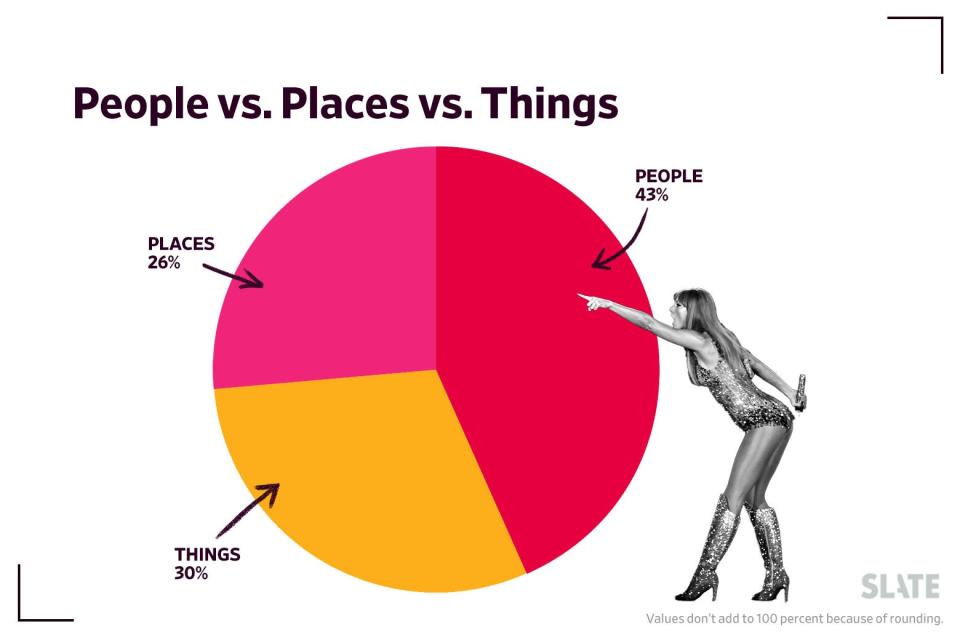
You can say you’re a “people person,” but do you have the data to back it up? Taylor Swift does: “People” was far and away the biggest category of proper nouns on her album. Here’s the complete list, with some brief annotations.
? Aimee: A bully to whom the song “thanK you aIMee” is addressed. It’s unclear whether she is a stand-in for a real person, but the song’s capitalization indicates that the track is also about another sometimes foe of Swift’s, Kim Kardashian.
? Aristotle: The Ancient Greek philosopher.
? The Blue Nile: A Scottish band whose songs include “The Downtown Lights”—Swift name-drops both the group and the song on “Guilty as Sin?”*
? The Bolter: Most likely refers to Idina Sackville, a British aristocrat who was married and divorced five times.
? Cassandra: In Greek mythology, she was given the gift of prophecy but cursed to be believed by no one. (In this case, the unheeded warning is pretty clearly meant to be the one Swift tried to give us about Kanye West.)
? Chloe or Sam or Sophia or Marcus: On the song of the same name, Swift sings about an ex-lover who hooked up with “somebody … named Chloe or Sam or Sophia or Marcus,” suggesting that the ex regularly hooked up with different women and men.
? Clara Bow: The silent film star and original “it” girl.
? Daddy: Either Swift’s actual father, Scott Swift, or some imagined father figure.
? Eve: Biblical first woman, married to Adam, ate the forbidden fruit, etc.
? Jack: Fans are pretty sure this is Jack Antonoff, Swift’s longtime producer.
? Lost Boys: From the Peter Pan story.
? Lucy: Fans think this is Lucy Dacus, friend and collaborator of Swift’s.
? Stevie Nicks: The singer-songwriter and onetime member of Fleetwood Mac.
? Peter: As in Pan, the boy who never wanted to grow up.
? Charlie Puth: The funniest and most spit take–inducing proper noun on the album has to be pop star Puth, who is paid a backhanded compliment on the song “The Tortured Poets Department.”
? Sarahs and Hannahs: In “But Daddy I Love Him,” Swift sings about “Sarahs and Hannahs in their Sunday best/ Clutchin’ their pearls, sighing, ‘What a mess.’ ” These Sarahs and Hannahs are stand-ins for a larger group of fans that Swift perceives to be judging her.
? Patti Smith: The musician, poet, painter, and memoirist.
? Mr. Steal Your Girl: On “LOML,” Swift sings about someone who is a “cinephile in black and white … Mr. Steal Your Girl, then make her cry.” While it’s not an overt reference, it calls to mind the popular 2014 song “Mr. Steal Your Girl” by Trey Songz, an artist who has unfortunately been accused of sexual assault multiple times. (Songz has denied the allegations.)
? Taylor Swift: You should know who this is. In “Clara Bow,” Swift sings her own name in her lyrics, worrying that her fame could be similarly fleeting.
? Dylan Thomas: The 20th-century Welsh poet.
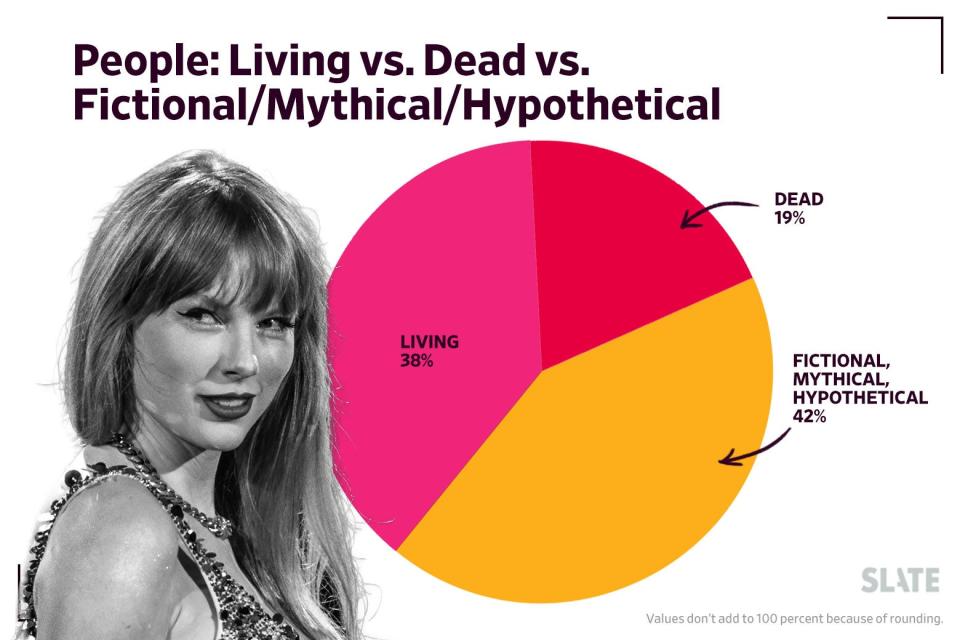
Many of the people Swift mentions are names you’ll recognize, from Patti Smith to Taylor Swift herself. Congratulations to Taylor Swift for finally being mentioned in a Taylor Swift song! (Well, she was also mentioned on songs like “22” and “Look What You Made Me Do,” but those mentions were spoken, not sung.) Some of the other references to people on the album are more vague—the “Lucy” and “Jack” mentioned on “The Tortured Poets Department” don’t get last names, but it’s not hard to figure out who they are. Then there are references to people from mythology and religion, like Cassandra and Eve. And there are some people who are sort of made up but not quite fictional? The Hannahs and Sarahs, the Chloe or Sam or Sophia or Marcus—let’s call these hypothetical people.
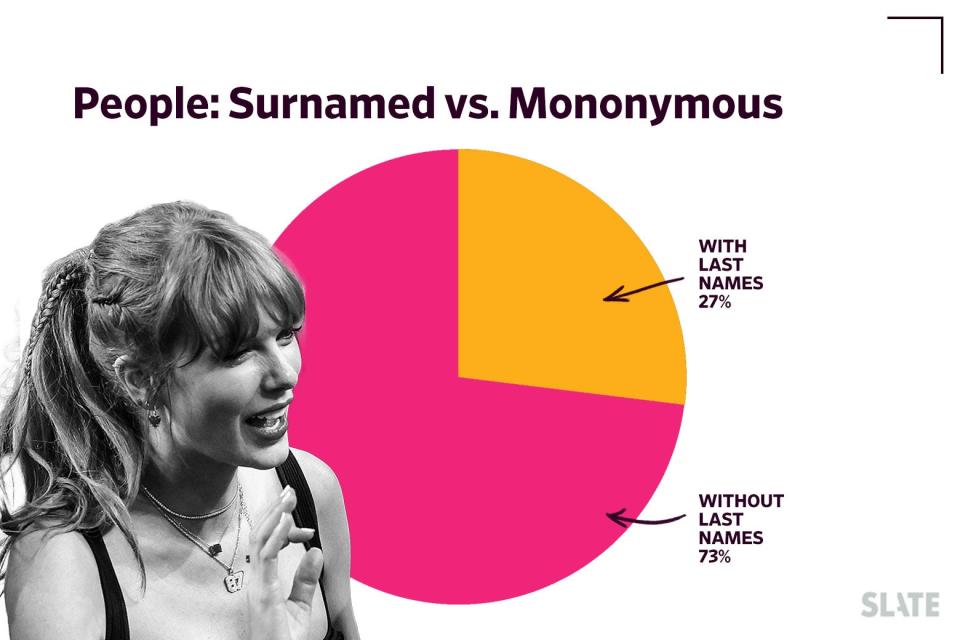
The Sarahs and the Hannahs loom large both in Swift’s mind and on the album, where they outnumbered the Stevie Nickses and Dylan Thomases—that is to say, more people on the album were referred to without a last name than with. For anyone wondering, we counted the Bolter and the Lost Boys among the no-last-namers but Mr. Steal Your Girl as among the surnamed.
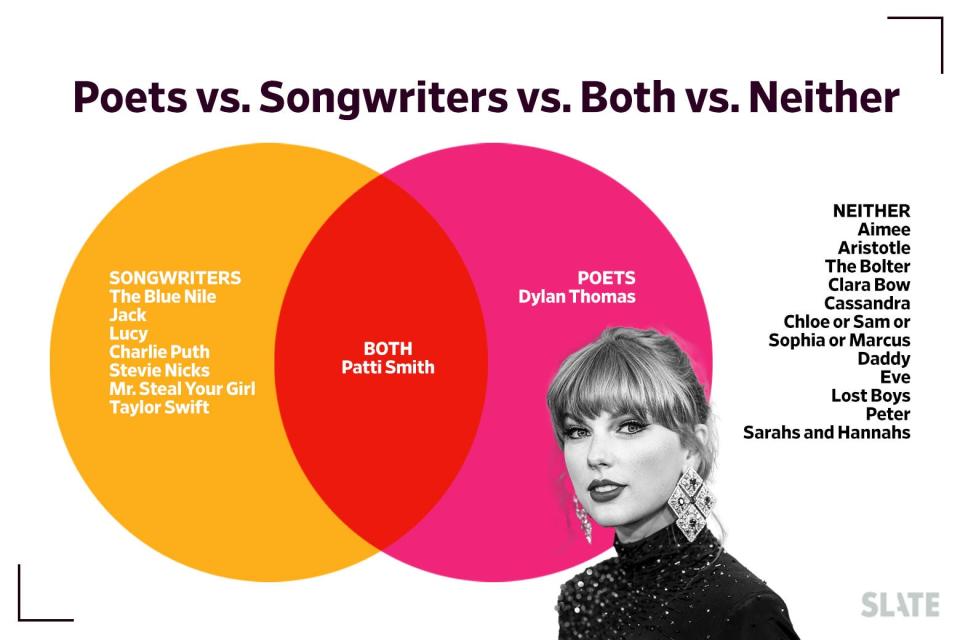
For an album named after tortured poets, does it actually mention any? Yes, at least two, and maybe more, depending on your definition of poet. Thomas and Smith are the only traditional poets mentioned on the album, but if songwriters count as poets, there are a bunch more, including Jack, Lucy, Puth, and the chairman of the Tortured Poets Department herself. To clarify the status of Mr. Steal Your Girl once more, we counted him as a songwriter because he is presumably one and the same as Trey Songz. Aristotle, while confusingly being the author of Poetics, was not a poet, so he didn’t make the list. While it’s possible that Taylor Swift’s dad and Clara Bow write or wrote poetry, we don’t know about it, so it doesn’t count, and neither, sorry to say, do any hypothetical poems written by our hypothetical cast of characters.
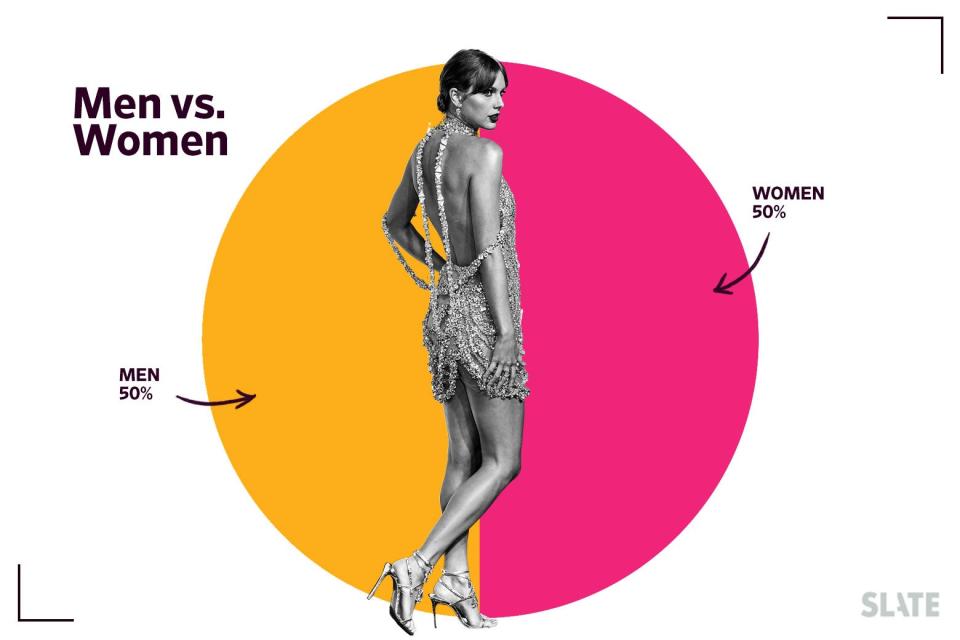
Swift deservedly has a reputation for writing about the men in her life, but that doesn’t mean she doesn’t write about women too—on this album, she evenly splits her mentions of men and women. A caveat: In the song “Chloe or Sam or Sophia or Marcus,” we counted Sam as a man’s name, though it could just as easily be a woman’s.
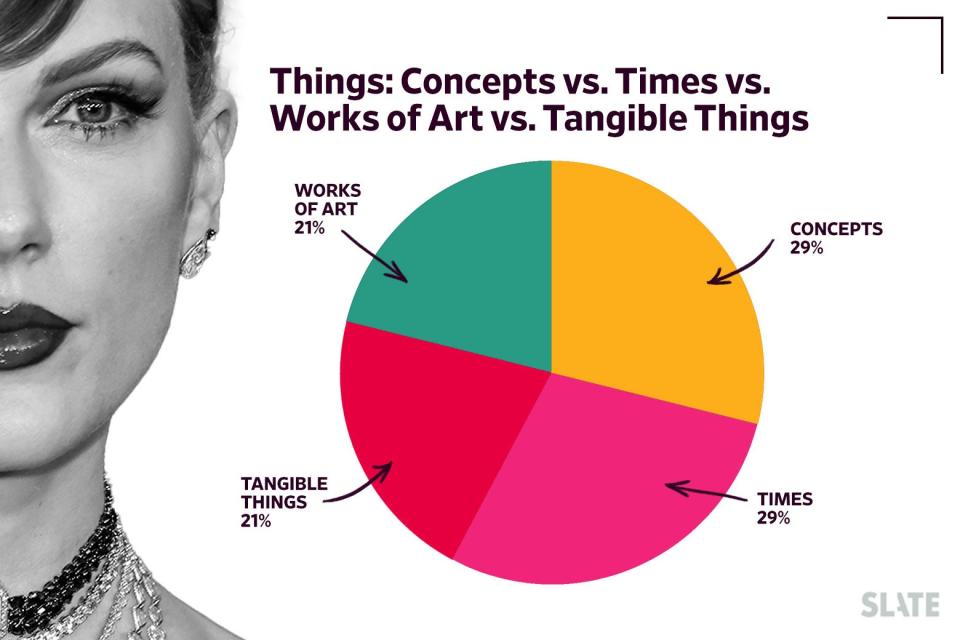
Onward to the things, which we decided to break up into concepts, times, works of art, and tangible things. To get ahead of this, please forgive us for categorizing dogs as a thing, but in our defense, where else would they have fit?
? American Dreams: Basically the idea that anyone can be happy and successful in America.
? Christian: Related to Christianity, a major religion.
? CPR: A technique for resuscitating someone’s heartbeat in an emergency.
? Jehovah’s Witness: Someone who practices a denomination of Christianity known for its evangelism … but apparently not for its menswear, if you go by Swift’s opinion in “The Smallest Man Who Ever Lived.”
? February: A month in the winter, can be cold.
? Saturday: A day of the week.
? Sunday: Also a day of the week, the one after Saturday. Singing about the weekend might actually represent a shift for Swift: Remember when she was always singing about Tuesdays?
? Christmas: A Christian holiday celebrating the birth of Jesus.
? “The Downtown Lights”: The Blue Nile song mentioned on “Guilty as Sin?”*
? American Pie: A teen sex comedy from 1999.
? Grand Theft Auto: A video game whose object is to steal cars.
? Aston Martin: A luxury car.
? Golden retrievers: A dog breed.
? Kens: Dolls that are the male counterpart to Barbie. Ryan Gosling is just them.
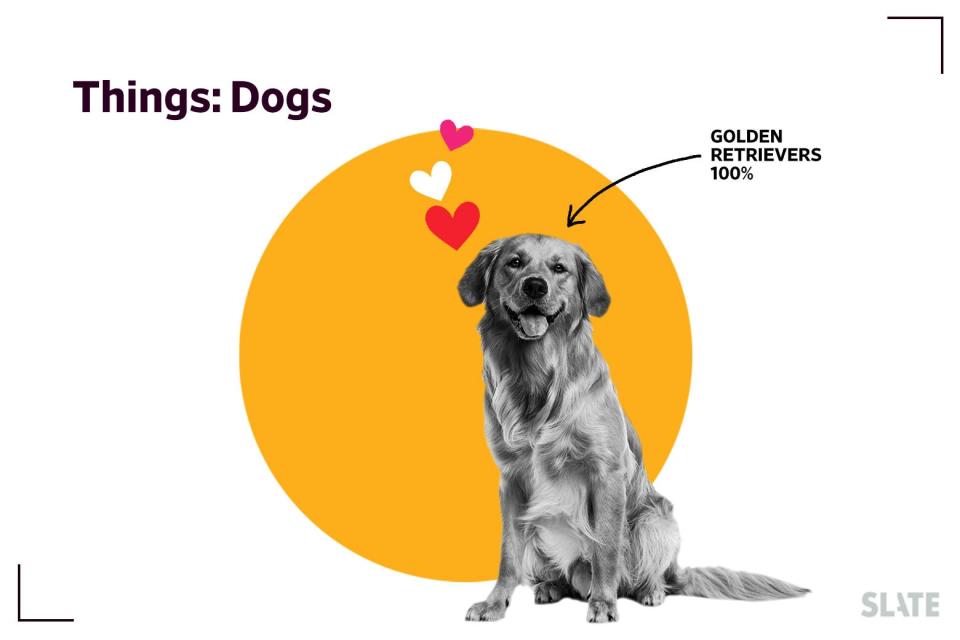
To make it up to you for calling dogs a thing, here’s a special chart all about the dogs Swift refers to on this album. Surprise: She refers to only one type, golden retrievers, so they get the whole pie! Dog breeds are not technically proper nouns, but we’d feel even more guilty if we left them out altogether.
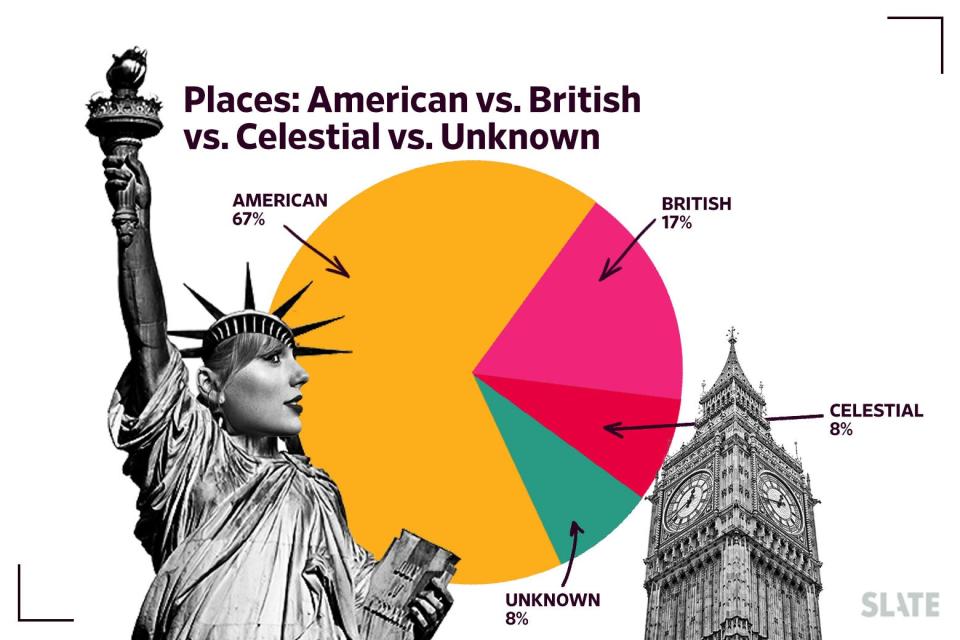
Now on to places, which we decided to break into geographic categories and the majority of which hardly require any explanation.
? America: Doesn’t get more American than this.
? Central Park Lake: The lake within New York’s Central Park.
? Chelsea Hotel: A hotel in New York historically associated with 20th-century artists.
? Destin: A city in Florida.
? Florida: A state.
? L.A.: Los Angeles, the California city.
? Manhattan: The most well-known borough of New York City.
? Texas: Another state.
? London: The city in England.
? The Heath: Most likely Hampstead Heath, a public space in London.
? The moon: It orbits the Earth, was recently seen eclipsing the sun, and is mentioned on the song “The Prophecy.”
? The Black Dog: A bar mentioned in the song of the same name. Is it a real bar? Where? Unclear. Also a common metaphor for depression.
Last year, Swift and her British boyfriend Joe Alwyn broke up, an event she is presumably referring to in the song “So Long, London.” Does the data back up Swift’s turn away from Great Britain back toward her homeland? Indeed it does. That’s our Miss Americana.
